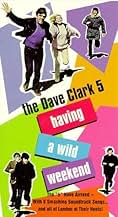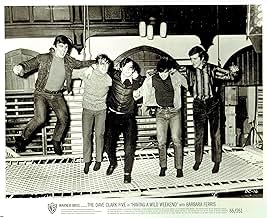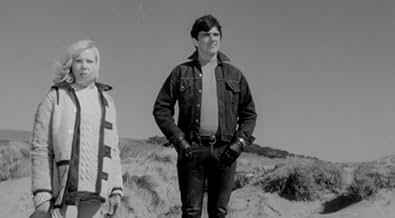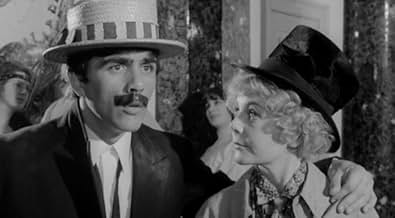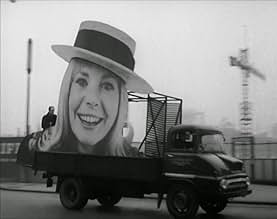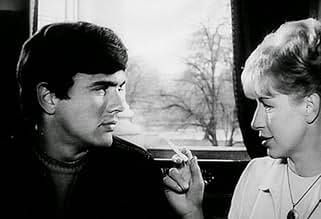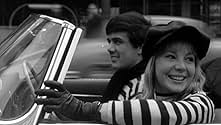Agrega una trama en tu idiomaDinah is a model whose face appears in an ad campaign for meat. While shooting a TV commercial, she and Steve, one of the stunt men, run off together. The advertising executives use their di... Leer todoDinah is a model whose face appears in an ad campaign for meat. While shooting a TV commercial, she and Steve, one of the stunt men, run off together. The advertising executives use their disappearance to generate more publicity for meat.Dinah is a model whose face appears in an ad campaign for meat. While shooting a TV commercial, she and Steve, one of the stunt men, run off together. The advertising executives use their disappearance to generate more publicity for meat.
- Nominada a1 premio BAFTA
- 1 nominación en total
Dave Clark
- Steve
- (as The Dave Clark Five)
- Dirección
- Guionista
- Todo el elenco y el equipo
- Producción, taquilla y más en IMDbPro
Opiniones destacadas
I've got to admit that I resisted John Boorman's first film, an effort to replicate the success of The Beatles' A Hard Days Night by fellow British Invasion band the Dave Clark Five. It was hard to figure out what was even going on with five, young British men that all kind of looked alike and, separated by almost sixty years from their celebrity, difficult to differentiate. However, the movie does gain a focus as it goes, and it's a surprisingly intelligent and sad one at that. I wonder if part of the issue is a reported creative tug of war between Boorman and his main star Dave Clark who was trying to use the film as something of a star vehicle for himself.
Steve (Clark) is the lead of five stuntmen working on a series of ads for meat also starring Dinah (Barbara Ferris), an ad campaign developed by Leon (David de Keyser) back at the office while Steve, Dinah, and the other four members of the band, I mean, stunt team, work on a commercial at a meat packing plant. Steve gets too sick of it all and, in between shots with Dinah along with him in the great looking Jaguar from the production, decides to just abscond. If what follows wasn't inspired by Jean-Luc Godard's Breathless, I'll eat my shoe, for what follows is a largely aimless series of events as Steven and Dinah escape their jobs, London, and their lives.
However, I'll get some crap for this, I think Boorman does Breathless better than Godard did. I'm not going to go in to why I've never, ever been able to get into Breathless, but I do end up getting into Boorman's take much more than Godard's.
The journey that Steve and Dinah takes is a journey into something like dreams. Not the dreams of the night but the dreams of the day. They are both out to discover the literal location of Burgh Island, a vacation spot in the middle of winter. To get there, they keep to the side roads and encounter Beatniks in an abandoned south English town and getting a ride from a married couple Guy (Robin Bailey) and Nan (Yootha Joyce). It was at the couple's house where I discovered my first sense of the warring creative senses, and it all has to do with a scene between Dinah and Guy. It's obvious that both Guy and Nan are trying to have sex with their visitors, while the couple teases the other at their lack of success as they also feign jealousy of each other's attempts, Guy brings Dinah up to his collection of old movie stuff, what he calls the pop history of the world, and the two speak of the effervescent nature of memory and life. This is also around the point where Leon, at his office in London, looks at a series of projected images of Dinah in a framing that recalls Bergman's Persona, though this came out a year prior to Bergman's film (did Boorman inspire Bergman?!). There's something really intelligent going on under the surface here, and it just comes more to the surface as the film goes on.
The rest of the Dave Clark Five join them for a costume party. At the party, with the ad agency's men on their tail in order to capture the end of Dinah's run for promotion purposes, the movie becomes more in line with a knockoff of A Hard Day's Night with everyone dressing as movie characters (including a couple of Marx Brothers) while antics go on as the five and Dinah escape. Steve and Dinah break off and go straight to Burgh Island, and the finale is a weirdly dreamy, ironic, and even somewhat touching ending to this strange little weekend. It's there that they discover, on this abandoned vacation spot that will only reopen after winter, that they've been allowed to run around in order to help promote the meat campaign, creating a feeling of artificiality about the journey, matched visually by this island which, when the tide is low, actually connects to the land by a sandbar. It's not an island, and they were never really quite free. How much of what they felt as they discovered beatniks, ran from the British military (it's a strange little episode), fled from paparazzi, and generally just ran around the southern countryside of England was actually real?
For a film that was obviously marketed as just another zany little adventure for some British invasion pop band that seems to have been completely forgotten by the culture in the decades since, that's a surprisingly sedate and pensive note to end things on.
As the film progressed, I saw these flashes of cinematic influence and a take on freedom in a controlled culture (specifically show business, but it could extend out from there generally) that actually showed the film had a fair bit on its mind beyond silly antics. The silly antic stuff is fine, but it feels a bit lazy and not all that well thought out, like Boorman and Clark just set up the cameras and waited for magic to happen. The lack of clarity around the opening as well is something of a frustration, but once this film settles down, it becomes quite compelling. I would assume that Boorman had more responsibility for the scenes that captured my attention more because Clark is generally not in them save the ending, so this feels like a really interesting place for the nascent feature film director, fresh from a starting point in British television, to start.
Steve (Clark) is the lead of five stuntmen working on a series of ads for meat also starring Dinah (Barbara Ferris), an ad campaign developed by Leon (David de Keyser) back at the office while Steve, Dinah, and the other four members of the band, I mean, stunt team, work on a commercial at a meat packing plant. Steve gets too sick of it all and, in between shots with Dinah along with him in the great looking Jaguar from the production, decides to just abscond. If what follows wasn't inspired by Jean-Luc Godard's Breathless, I'll eat my shoe, for what follows is a largely aimless series of events as Steven and Dinah escape their jobs, London, and their lives.
However, I'll get some crap for this, I think Boorman does Breathless better than Godard did. I'm not going to go in to why I've never, ever been able to get into Breathless, but I do end up getting into Boorman's take much more than Godard's.
The journey that Steve and Dinah takes is a journey into something like dreams. Not the dreams of the night but the dreams of the day. They are both out to discover the literal location of Burgh Island, a vacation spot in the middle of winter. To get there, they keep to the side roads and encounter Beatniks in an abandoned south English town and getting a ride from a married couple Guy (Robin Bailey) and Nan (Yootha Joyce). It was at the couple's house where I discovered my first sense of the warring creative senses, and it all has to do with a scene between Dinah and Guy. It's obvious that both Guy and Nan are trying to have sex with their visitors, while the couple teases the other at their lack of success as they also feign jealousy of each other's attempts, Guy brings Dinah up to his collection of old movie stuff, what he calls the pop history of the world, and the two speak of the effervescent nature of memory and life. This is also around the point where Leon, at his office in London, looks at a series of projected images of Dinah in a framing that recalls Bergman's Persona, though this came out a year prior to Bergman's film (did Boorman inspire Bergman?!). There's something really intelligent going on under the surface here, and it just comes more to the surface as the film goes on.
The rest of the Dave Clark Five join them for a costume party. At the party, with the ad agency's men on their tail in order to capture the end of Dinah's run for promotion purposes, the movie becomes more in line with a knockoff of A Hard Day's Night with everyone dressing as movie characters (including a couple of Marx Brothers) while antics go on as the five and Dinah escape. Steve and Dinah break off and go straight to Burgh Island, and the finale is a weirdly dreamy, ironic, and even somewhat touching ending to this strange little weekend. It's there that they discover, on this abandoned vacation spot that will only reopen after winter, that they've been allowed to run around in order to help promote the meat campaign, creating a feeling of artificiality about the journey, matched visually by this island which, when the tide is low, actually connects to the land by a sandbar. It's not an island, and they were never really quite free. How much of what they felt as they discovered beatniks, ran from the British military (it's a strange little episode), fled from paparazzi, and generally just ran around the southern countryside of England was actually real?
For a film that was obviously marketed as just another zany little adventure for some British invasion pop band that seems to have been completely forgotten by the culture in the decades since, that's a surprisingly sedate and pensive note to end things on.
As the film progressed, I saw these flashes of cinematic influence and a take on freedom in a controlled culture (specifically show business, but it could extend out from there generally) that actually showed the film had a fair bit on its mind beyond silly antics. The silly antic stuff is fine, but it feels a bit lazy and not all that well thought out, like Boorman and Clark just set up the cameras and waited for magic to happen. The lack of clarity around the opening as well is something of a frustration, but once this film settles down, it becomes quite compelling. I would assume that Boorman had more responsibility for the scenes that captured my attention more because Clark is generally not in them save the ending, so this feels like a really interesting place for the nascent feature film director, fresh from a starting point in British television, to start.
John Boorman in his first outing as a director, he does a reasonable job of capturing the media and fashion scene in 1965. He also presents some great shots of the handsome, iconic locations in London, Bath and then Devon. Filmgoers can clearly see the similarities of this film, with Dick Lester's Beatles 1964 film, 'Hard Days Night' by the frantic scurrying around by Dave and his group in an attempt to give the film energy. Nevertheless, under Boorman's direction the film has pace and tempo, hence never allowing scenes to drag. However, like all films with pop singers and groups, the acting is substandard. The problem for Boorman was to have the group hanging around locations while in the background, Dave Clark as Steve, is grabbing all the action as well as the beautiful model, played by Barbara Ferris. At times I felt sorry for them, as they were never more than shadows, gawping at Dave as he had all the lines. The storyline is thin and lacks sparkle. Ferris comes across as a bit of an airhead model and Dave Clark, as Steve, looks sullen, moody and plain miserable for most of the time. His acting is rather wooden and as he had the lead role, watching the film is heavy going. With a dull and melancholy storyline, I found the whole thing uninspiring and pretentious.
I was surprised in a positive way. In judging a 60s British pop film it's only fair to look beyond the Beatles at the wider canon and it contains some proper turkeys, stiff, cliched and beyond banal. Occasionally though filmmakers at least tried to be interesting and off-the-wall and this is one of those occasions. It doesn't always work and it's a bit flat in places but it definitely has its moments. The segment with the proto-hippies (or evolving beatniks) is particularly fascinating as a snapshot of a cultural undercurrent entering the mainstream consciousness. As with all films part of its appeal is in what, even unwittingly, the film shows us of the period in which it was made. As other reviewers have noted in that respect there are some revealing shots of of some very bemused members of the public in what is presumably London, all grey and very unSwinging. So not great but well worth sitting through.
John Boorman's first feature, obviously thrown together as a cash in on "A Hard Day's Night"; shows his skill and promise as a director from the
get go. Dave Clark (of the Dave Clark Five) and a model who could be the girl George Harrison dismisses in the agent's office in "Hard Day's Night; take off on a holiday weekend across England as her obsessive manager trys to hunt her down.
In a series of scenes that seem halfway improvised, they run into aimless young people, uptight middle class folks, and others. The movie goes out of it's way to portray these people as, well, people and not "types", i.e. mods or rockers, hips or squares. There is a silly romp section around the roman baths at Bath.
The Dave Clark Five, the reason for the whole movie, are kept in the background even more than the Spencer Davis Group in "The Ghost Goes Gear." Only three songs are heard, but they're not bad. An interesting neither fish nor fowl entry, should be seen by British Invasion fans or fans of Boorman( I'm both).
get go. Dave Clark (of the Dave Clark Five) and a model who could be the girl George Harrison dismisses in the agent's office in "Hard Day's Night; take off on a holiday weekend across England as her obsessive manager trys to hunt her down.
In a series of scenes that seem halfway improvised, they run into aimless young people, uptight middle class folks, and others. The movie goes out of it's way to portray these people as, well, people and not "types", i.e. mods or rockers, hips or squares. There is a silly romp section around the roman baths at Bath.
The Dave Clark Five, the reason for the whole movie, are kept in the background even more than the Spencer Davis Group in "The Ghost Goes Gear." Only three songs are heard, but they're not bad. An interesting neither fish nor fowl entry, should be seen by British Invasion fans or fans of Boorman( I'm both).
The Dave Clark Five are certainly no match for the Beatles, but this film is easily worthy of comparison with A Hard Day's Night and Help! A lot of the credit must go to director John Boorman (giving a taste of the visual pyrotechnics he later unleashed in Point Blank), and to the surprisingly melancholy screenplay by Peter Nichols. (Georgy Girl, Privates on Parade)
Two young people, a stuntman (Dave Clark) and a model (Barbara Ferris), go AWOL from a commercial shoot and embark on a trip across England. But their jaunt isn't all larky fun. They bicker and quarrel, they encounter a self-consciously hip and desperately unhappy married couple; they find that their exploits have been incorporated into the glitzy ad campaign they were trying to escape from in the first place.
A fun little rock and roll film that makes dark observations about the impermanence of youthful exuberance, the futility of youthful rebellion, and the commodification of youth culture. Overall, the tone is more in keeping with the manic depressive grunge rock aesthetic than with the go-Go-GO madcap vibe of other youth films of the 60s.
Two young people, a stuntman (Dave Clark) and a model (Barbara Ferris), go AWOL from a commercial shoot and embark on a trip across England. But their jaunt isn't all larky fun. They bicker and quarrel, they encounter a self-consciously hip and desperately unhappy married couple; they find that their exploits have been incorporated into the glitzy ad campaign they were trying to escape from in the first place.
A fun little rock and roll film that makes dark observations about the impermanence of youthful exuberance, the futility of youthful rebellion, and the commodification of youth culture. Overall, the tone is more in keeping with the manic depressive grunge rock aesthetic than with the go-Go-GO madcap vibe of other youth films of the 60s.
¿Sabías que…?
- TriviaFilming was interrupted on location when leading man Dave Clark complained about the film's costumes to Alexander Jacobs, who was the assistant to the film's producer, David Deutsch. Jacobs was married to the costume designer and reacted to Clark's remarks by punching him in the face. Clark's nose became, for a short time, extremely swollen and he could not be photographed, but he responded well to emergency medical treatment and shooting eventually continued.
- ErroresSince Britain's military training and target areas would most certainly be fenced-off and clearly sign-posted, the notion that hippies could (or even would) squat inside an obviously bombed-out building or that Steve and Dinah could simply drive a vehicle into such a danger zone is ludicrous at best, not to mention that an armed platoon of soldiers wouldn't check ahead for any potential trespassers before opening fire.
- ConexionesEdited into Dusk to Dawn Drive-In Trash-o-Rama Show Vol. 10 (2007)
Selecciones populares
Inicia sesión para calificar y agrega a la lista de videos para obtener recomendaciones personalizadas
- How long is Having a Wild Weekend?Con tecnología de Alexa
Detalles
- Tiempo de ejecución1 hora 31 minutos
- Color
- Relación de aspecto
- 1.85 : 1
Contribuir a esta página
Sugiere una edición o agrega el contenido que falta

Principales brechas de datos
By what name was Catch Us If You Can (1965) officially released in India in English?
Responda
